Introducing: Marshall McLuhan
In honour of his 112th birthday, and with a slight nod to another notable Canadian, John Ruskin, this week we ask Marshall McLuhan: “who are you?”
“Seen at a great distance, famous people acquire a quite unreal and discouraging character. Seen close up, the quite human limitations and foibles of such people can be the greatest possible stimulus to self-assertion.
(‘Autobiography’, n.d.)
Herbert Marshall McLuhan was born this day, July 21st, in 1911 in Edmonton, Alberta. He lived a few years there before moving to Winnipeg, Manitoba, spending the majority of his adult life in Toronto, Ontario.
But who was he, what was he up to? There are many ways to go about answering that question, but I thought it would be an interesting exercise to pull some quotes from my collection where Marshall says “I am…”.
One of the most spectacular examples of this is his 1951 letter to Ezra Pound:
“I am an intellectual thug who has been slowly accumulating a private arsenal with every intention of using it. In a mindless age every insight takes on the character of a lethal weapon. Every man of goodwill is the enemy of society. Lewis saw that years ago. His ‘America and Cosmic Man’ was an H-bomb let off in the desert. Impact nil. We resent or ignore such intellectual bombs. We prefer to compose human beings into bombs and explode political and social entities. Much more fun. Lewis clears the air of fug. We want to get rid of people entirely. And it is necessary to admire the skill and thoroughness with which we have made our preparations to this.
I am not of the ‘we’ party. I should prefer to de-fuse this gigantic human bomb by starting a dialogue on the side-lines to distract the trigger-men, or to needle the somnambulists. In London 1910 you faced various undesirable states of mind. Since then the word has been used to effect a universal hypnosis. How are words to be used to unweave the spell of print? Of radio commercials and “news”-casts? I am working on *that* problem. The word is now the cheapest and most universal drug.
(letter to Ezra Pound, June 22, 1951)
Who am I: an intellectual thug, the enemy of society.
What am I up to: distracting the trigger-men, needling the somnambulists, trying to figure out how to do that when all our means of communication seem to put people to sleep rather than wake them up.
In the first lengthy exposition on his 1958 statement, ‘the medium is the message,’ Marshall reveals himself as sincere in his object of trying to understand more fully the nature and effect of technologies, of trying to pass that on to the rest of us.
“Personally, I am not trying to upset people. I am really trying to understand media and to discover their unique dynamics.”
(‘The Medium is the Messsage,’ Forum magazine Volume 3 Number 4, 1960)
There is much to learn about who Marshall McLuhan was, and what he was up to, in his remarkable 1964 opus, ‘Understanding Me(dia): The Extensions of Man.’ There is a lot to say about that book, that guide to helping us understand and take control of our lives, but the best and briefest thing I can say about it is that you should read it. And if you’ve read it, you should re-read it. I’m about to teach it word by word, cover to cover, for the third time this September.
“I am in the position of Louis Pasteur telling doctors that their greatest enemy is quite invisible, quite unrecognized by them. Our conventional response to all media, namely that it is how they’re used that counts, is the numb stance of the technological idiot.”
(‘Understanding Media: The Extensions of Man’ 1964)
“I am pretty sure that my book will enable small children to have the feeling of superior knowledge over their teachers and professors in universities, and over their parents, but I don’t endorse this as a suitable reason for reading my stuff at all.”
(1966 interview on ‘Understanding Media: The Extensions of Man’)
Marshall McLuhan was a deeply conservative man. As he says below, and he’s being serious, he’s not a fan of change. He wanted to be left alone, and did not appreciate that he lived in a world where that was impossible. But he was also not someone to just complain about things. He made it his mission to try and get to the bottom of things, and to wake everyone else up to it.
Fulford: “What kind of world would you rather live in? Is there a period in the past or a possible period in the future you’d rather be in?
McLuhan: “No, I’d rather be in any period at all as long as people are going to leave it alone for a while.
Fulford: “But they’re not going to, are they?”
McLuhan: “No, and so the only alternative is to understand everything that’s going on, and then neutralize it as much as possible, turn off as many buttons as you can, and frustrate them as much as you can. I am resolutely opposed to all innovation, all change, but I am determined to understand what’s happening because I don’t choose to just sit and let the juggernaut roll over me. Many people seem to think that if you talk about something recent, you’re in favour of it. The exact opposite is true in my case. Anything I talk about is almost certain to be something I’m resolutely against, and it seems to me the best way of opposing it is to understand it, and then you know where to turn off the button.”
(interviewed by Robert Fulford on CBC’s ‘This Hour Has Seven Days,’ May 8, 1966)
He also insisted regularly that:
“’I am not a communicator. I am an investigator. I have no message. Discovery is what I am interested in.’
McLuhan says that if he has any message it is this: pay attention. Pay attention to what change is doing to us.”
(interviewed by Jack Fox, July 20, 1966)
“I am not a ‘culture critic’ because I am not in any way interested in classifying cultural forms. I am a metaphysician, interested in the life of the forms and their surprising modalities.”
(letter to Joe Keogh, July 6, 1970)
“As a student of the media, I cannot afford to be on the side of print. I have no point of view. I’m a person who swarms over a situation from all aspects simultaneously. I am a metaphysician of the media. That’s why I’m not interested in moral issues.”
(in The New York Times, October 5, 1970)
Marshall repeated himself a lot. He had to in order to get his point across.
“It is not easy to convince people that I am not dealing with ideas but perceptions, not concepts but observations. It is easy to disseminate ideas, but it is difficult to train new perception. People panic when invited to alter their habitual ways of seeing, of looking, of hearing, and feeling. They are quite right in supposing that an effort is being made to alter their identity.”
(letter to Michael Barkway, Financial Times of Canada, September 11, 1972.)
One of the joys of and excuses for a slightly messy or disorganized office/library/archive which is The McLuhan Institute is that it makes for discovery. I dread the day when there’s nothing new to find tucked into a drawer, a book, a folder.
After dad died (Eric McLuhan, January 19 1942 – May 18, 2018) I found a slim folder labeled ‘autobiography.’ In it were two typed pages, with no supporting documentation or notes. I can only speculate that it was composed sometime in the later 1960s, and perhaps for a magazine, though I’ve never seen it or parts of it in print. It is personal, reflective, concise, and packs quite a lot into two typed pages. Here are two of the last three paragraphs:
“During the past century art has revealed that the changing environment is not perceptible to unaided human attention. Throughout all human time, men have been engaged in conscious awareness of the preceding environment, which presents itself as a nostalgic art form. The current environment creates an overload of sensation that obliterates pattern and form. My study of literature became an aid to the perception that led me to undertake the task of understanding the relation between culture and technology.
I had begun my University studies as a student of Engineering, because of my interest in structure and design. It becomes more clear every day that structure and design in all levels of human organization are becoming orchestral. Our new electronic age no longer presents any specialized cultural gradient. Ours is the age of the non-gradient in which all times and cultures are in a continuous dialogue. To be a participant in this dialogue is most satisfying.”
(‘Autobiography,’ undated, small edition published Spring 2019 by TMI and Invisible Press, Picton)
It is nice to read that Marshall, who was likely, and understandably, frustrated by our collective lack of understanding, who spent so much effort ‘distracting the trigger-men’ and ‘needling the somnambulists,’ with so little result, also had a lot of fun and found much satisfaction in the process.
He spent the last year of his life unable to communicate, thereby released from the pressure and obligation to do so, and though that must have produced much frustration, if you look at photos from the time you see a very joyful person as well.
I hope these words have introduced you to unfamiliar sides of Marshall McLuhan. As with any public figure, it’s easy to imagine you know someone from hearing a short clip.
I hope also that you will join me in wishing him a happy birthday.
Andrew McLuhan
Bloomfield
July 21, 2023
Note: photos (copyright: Barbara Wilde) from the wedding of Eric and Sabina McLuhan, 1974, in England.




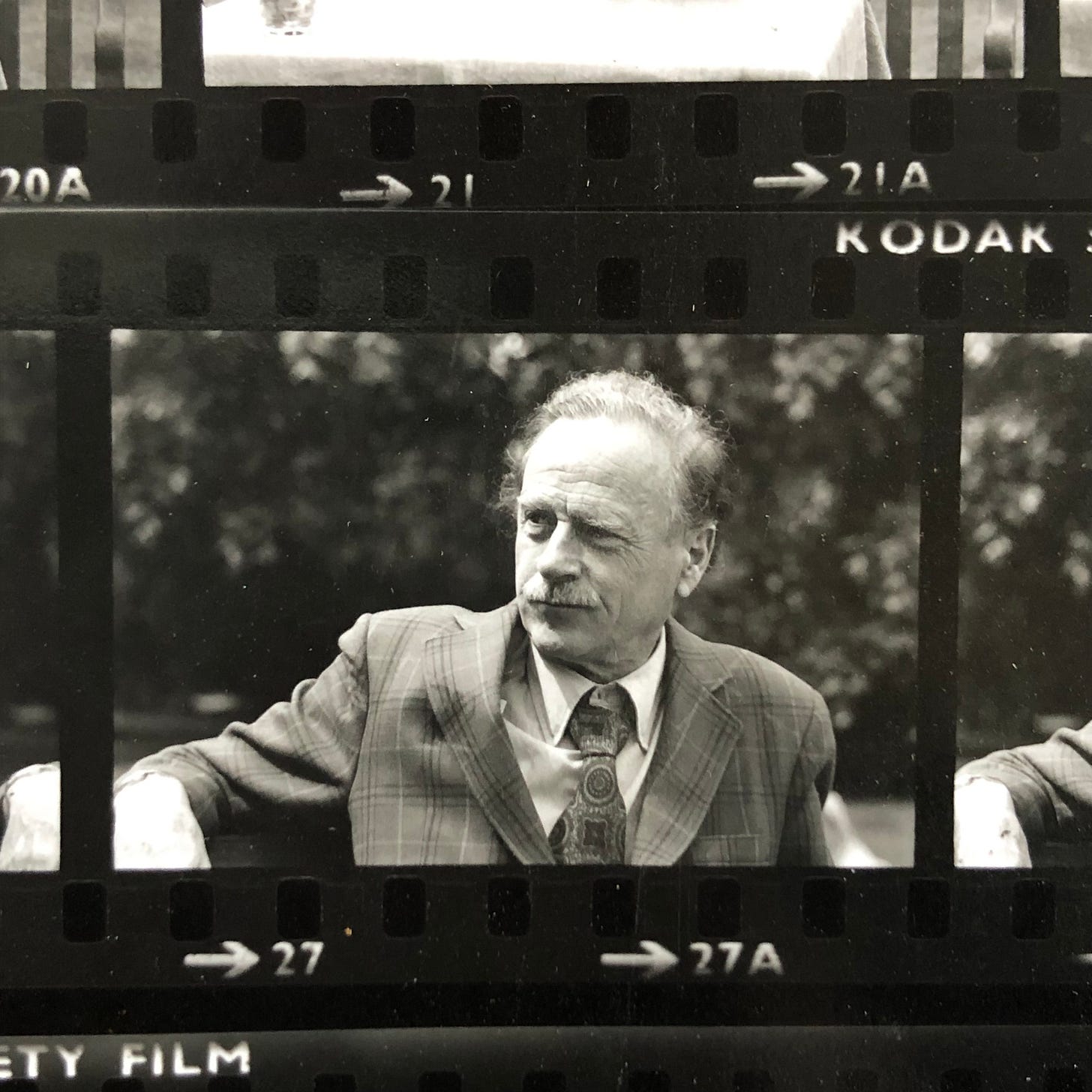


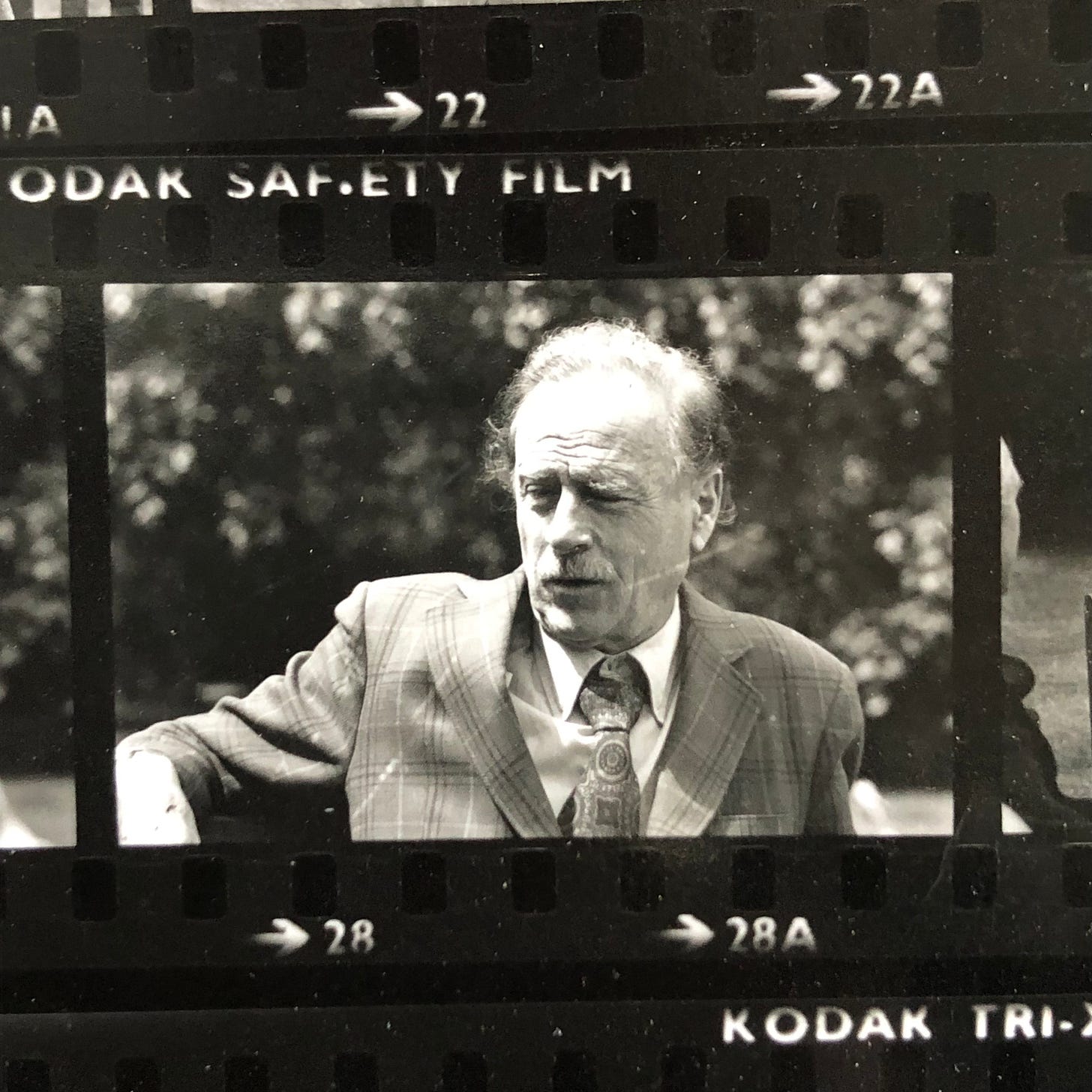
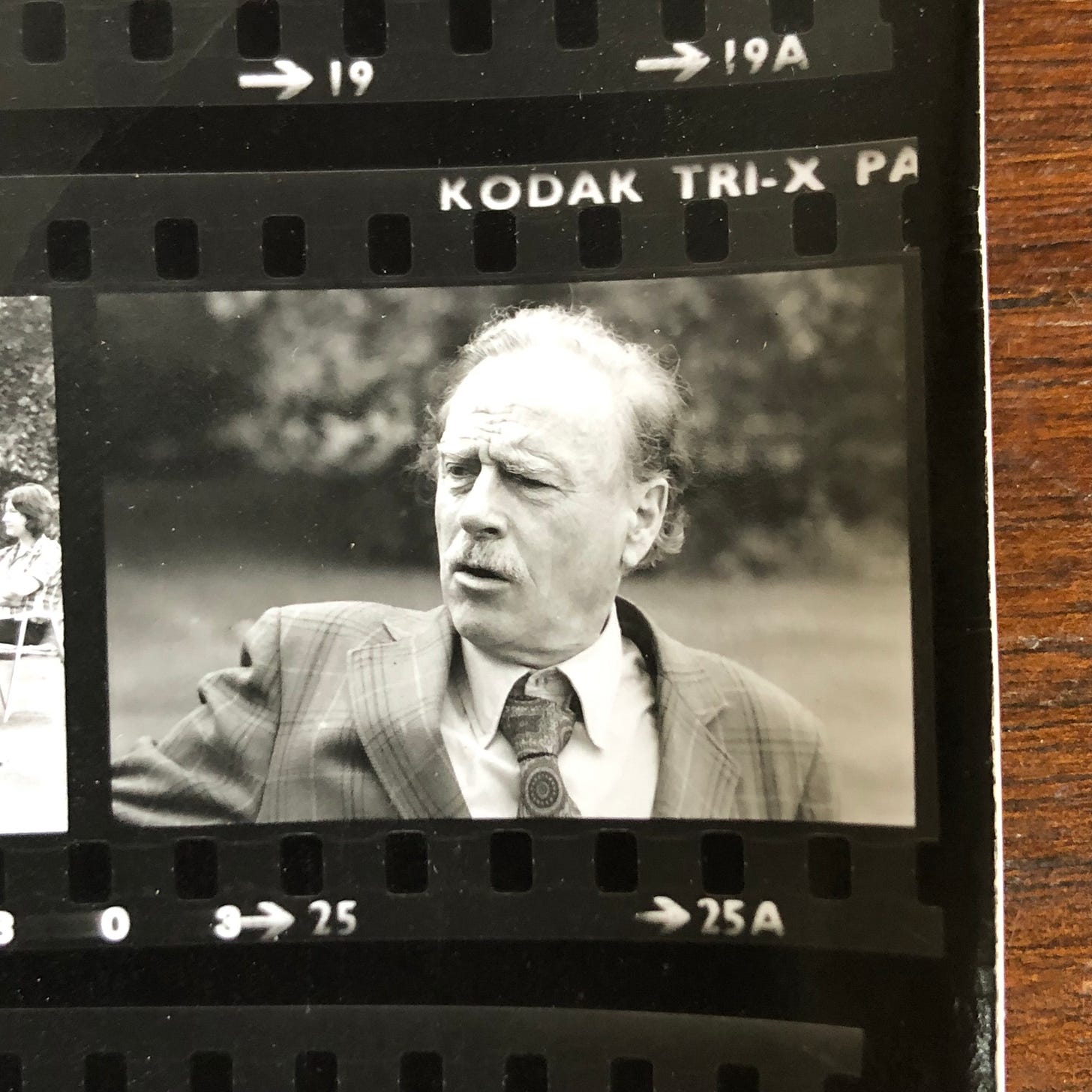
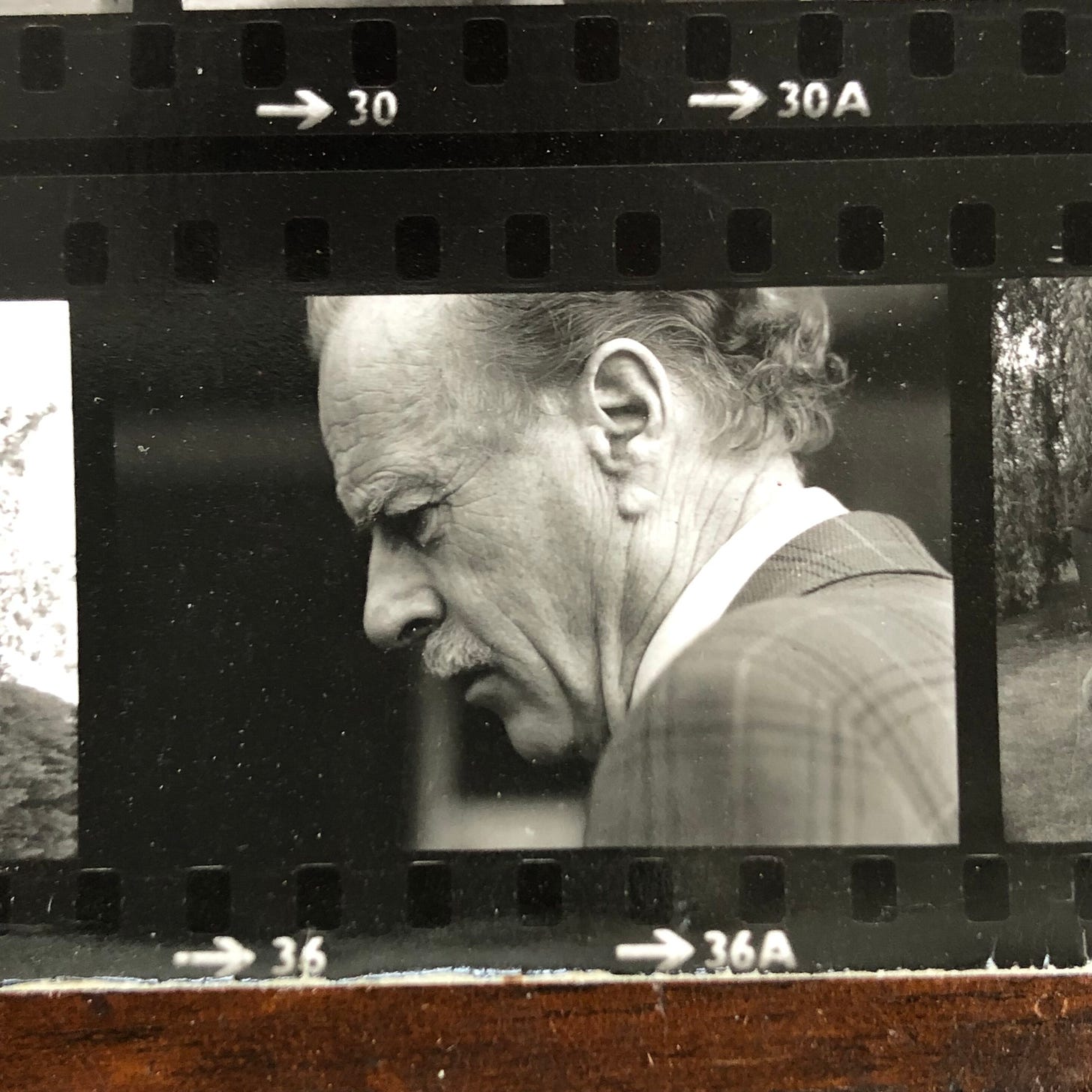
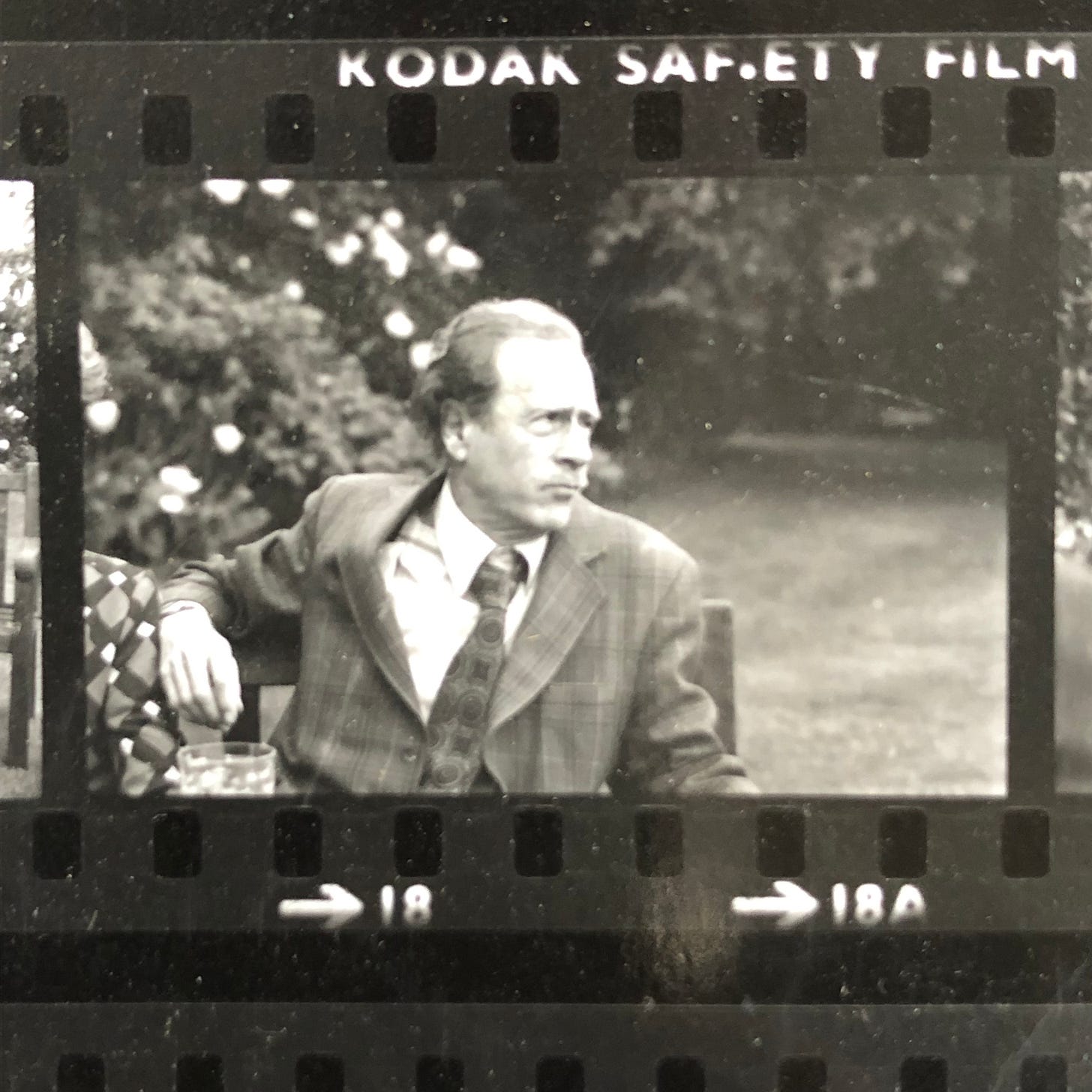
Your tribute is a perfect pitch Andrew! Bravo! 👏🍻
Thank you very much!